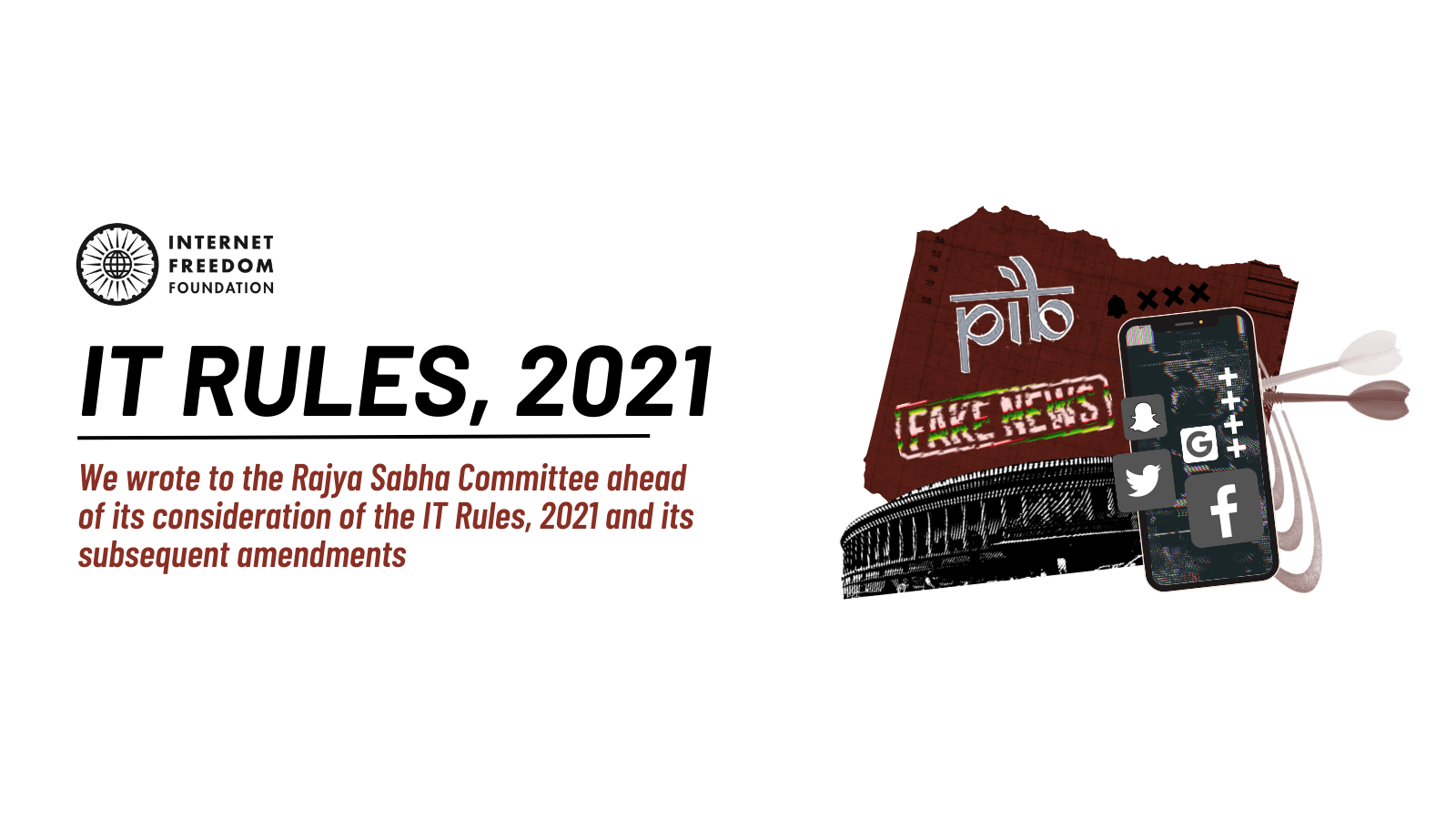
tl;dr
The Information Technology (Intermediary Guidelines and Digital Media Ethics Code) Rules, 2021 (“IT Rules 2021”) were notified in February 2021, and fundamentally changed the internet experience in India. On October 28, 2022, the Ministry of Electronics and Information Technology (“MeitY”) notified the Amendments to the Information Technology (Intermediary Guidelines and Digital Media Ethics Code) Rules, 2021 (“IT Amendment Rules 2022”), which introduced an additional layer of government-led censorship. On January 02, 2023, MeitY proposed amendments to the Rules to curtail online gaming. Again, on January 17, 2023, they issued a revised proposal to the amendment which made “fact-checking” a mandate of the Press Information Bureau (“PIB”), making the Union Government the final arbiters of free speech on the internet. The Rajya Sabha Committee on Subordinate Legislation is meeting on March 27, 2023, to consider the IT Rules, 2021 and its subsequent amendments - and we wrote to them expressing our gratitude for their consideration of the Rules, while citing our concerns as well as the impact on online free speech.
Why should you care?
The combination of the IT Rules, 2021 and the IT Amendment Rules, 2022, threaten freedom of speech on the internet. With the stated aim of providing users additional avenues for grievance redressal (apart from Courts and from the intermediaries themselves), the IT Amendment Rules, 2022 established government-appointed committees (Grievance Appellate Committees, or “GAC”) that decide on user appeals in intermediary-led content moderation decisions. This means that executive-appointed officials become arbiters of permissible speech on the internet - but this censorship is on the basis of grounds that are not stated in the Information Technology (“IT”) Act, 2000. Since further amendments have already been proposed to the Rules as they stand currently, the IT Rules, 2021 and the IT Amendment Rules, 2022, can only continue to cause grave injury to the constitutional and fundamental rights and freedoms of users. The Rajya Sabha Committee we have written to is meeting today to discuss this very problem - and it is important we voice our apprehensions and reservations.
Key Concerns with the IT Rules 2021 and IT Amendment Rules 2022
The IT Rules, 2021, to which these concerning amendments are proposed, itself suffers from excessive delegation of powers and executive overreach. To base the IT Amendment Rules, 2022 on the poorly-laid groundwork of the 2021 Rules is to add insult to injury. Chronologically, some issues with delegated legislation in the Rules (as they stand now) are as follows:
Expansion in the scope of regulation under the IT Act: A notification under the Allocation of Business Rules brought digital news media and OTT platforms under the regulatory purview of the IT Act, 2000. But this only conferred administrative clarity on which ministry gets administrative powers over the sector, not regulatory powers. For the latter, a parliamentary enactment is necessary - but instead of going to parliament, the IT Rules, 2021 expand the scope of regulation under its parent Act, i.e. the IT Act, 2000, to include digital news media and OTT platforms. This amounts to executive overreach and is ultra vires the Indian Constitution, with the executive amending parliamentary legislation.
Excessive delegation of powers: The IT Rules, 2021 established a non-judicial adjudicatory process to resolve grievances regarding content published by digital news media and OTTs. They also created an “oversight committee”, an adjudicatory body. Since the IT Act, 2000 does not specifically empower the Government to do so in this context, its creation amounts to arbitrary adjudication.
Government-appointed censorship body under legislative uncertainty: The creation of the GAC, i.e, executive-constituted committees, under the IT Amendment Rules, 2022 will make the Union Government the arbiter of permissible speech on the internet, instead of, ideally, an independent judicial or regulatory body. The grounds for such censorship have not been stated under Section 69A of the IT Act, 2000, nor under Article 19(2) of the Indian Constitution. Further, the GAC itself has no legal basis - having been constituted without the involvement of the legislature. This may create a scenario in which social media platforms and other intermediaries are incentivised to suppress speech unpalatable to the government, when in fact the basis of such an environment is unconstitutional from the beginning.
Draft Amendments to the IT Rules Incoming
The legality of the IT Rules, 2021 has been contentious since their notification, and the Rules themselves have been criticised by various relevant stakeholders. They, thus, fundamentally alter the right to freedom of speech and expression and privacy for millions of internet users in India. But wait! That’s not all! In January 2023, two new draft amendments were proposed to these Rules, which also suffer from executive overreach.
On January 02, 2023, MeitY proposed amendments to the IT Rules, 2021 in relation to online gaming. As in other cases listed above, online gaming was not previously regulated under the IT Act, 2000, and thus requires parliamentary sanction to be brought under its ambit. Since the parliamentary route was not adopted for its introduction within the purview of the IT Act, 2000, the regulation of online games through these Rules is misguided and undemocratic (Read our general criticisms on these proposed amendments here).
On January 17, 2023, MeitY proposed yet another revision to the IT Rules, this time vesting the Press Information Bureau (“PIB”) or any other relevant government agency with the power to identify or flag any online information as ‘fake’ or ‘false’. This renders the Union Government the final arbiters of permissible speech on the internet, as the intermediaries will be obliged to take down these flagged pieces of information as part of their due diligence requirements. Moreover, like the rest of the IT Rules, this revision is a gross violation of the Supreme Court ruling in Shreya Singhal vs. Union of India, which laid down strict procedures for the blocking of content (Read our criticisms of the proposed amendment here).
Conclusion
Given the contentious nature of the IT Rules, 2021 and the excessive, overreaching status its subsequent amendments grant to the executive, the consideration of the Rules from the lens of subordinate legislation may be an important step towards the withdrawal of the Rules as a whole. Our letter, dated March 24, 2023, to the Rajya Sabha Committee on Subordinate Legislation ahead of its meeting today, i.e. March 27, 2023, on this issue, details all these contentions. In addition to all members of the Committee on Subordinate Legislation, we also sent our letter to the Deputy Secretary of the Rajya Sabha Secretariat. Our persistent request to rescind the Rules have also been reiterated in the letter. As firm believers in the Constitution of India and institutional processes, we also offered our services for an oral deposition on request.
Important documents
- IFF’s letter dated March 24, 2023 to the Rajya Sabha Committee on Subordinate Legislation (link)
- Notice scheduling meeting of the Rajya Sabha Committee on Subordinate Legislation on March 27, 2023 (link)
- IFF's public brief on the IT Amendment Rules, 2022 (link)
- The Information Technology (Intermediary Guidelines and Digital Media Ethics Code) Amendment Rules, 2022. (link)
- The Information Technology (Guidelines for Intermediaries and Digital Media Ethics Code) Rules, 2021 (link)
- MeitY’s proposal to amend IT Rules, 2021 dated 6th June, 2022. (link)
- IFF’s submission on the proposed draft amendment to IT Rules 2021 (link)
- Our deep dive on how the IT Rules 2021 are unconstitutional and undemocratic, and how they will fundamentally change an Indian user's experience on the internet. (link)
- Draft amendments proposed to the IT Rules, 2021 in relation to online gaming (link)
- IFF’s comments on the Proposed Amendments in relation to online gaming, 2023 (link)
- Updated IT Rules, 2021 including the Proposed Amendments, 2023 and Revised Amendment in colour (link)IFF’s detailed comments on the Revised Amendments, 2023 in relation to fact-checking powers (link)


